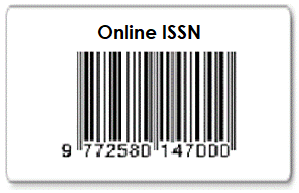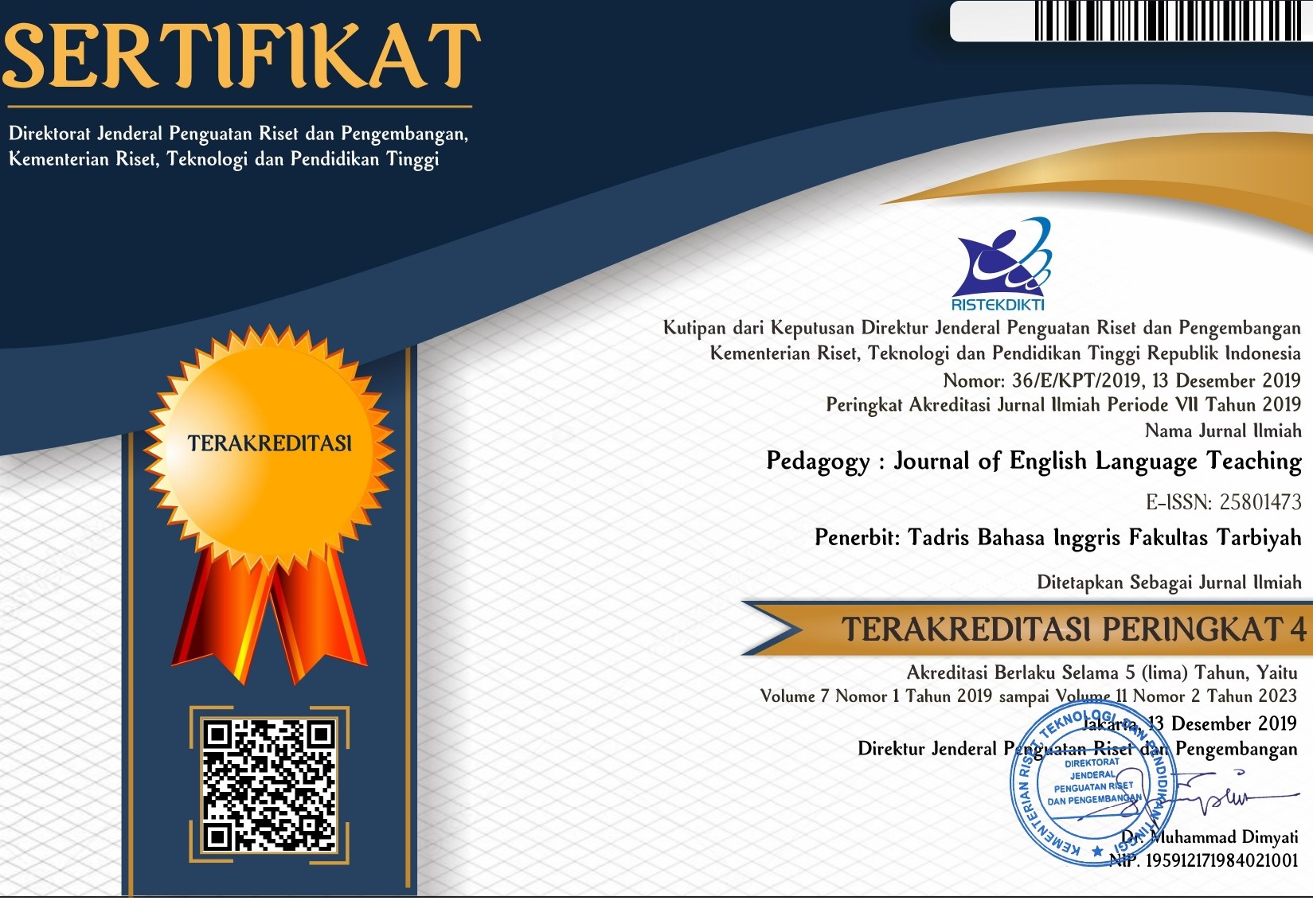Enhancing University Students’ Academic Presentation Skills through Mnemonic-Based Strategies
DOI:
https://doi.org/10.32332/nkaht604Keywords:
academic presentation, communication skill, memonic-based strategy, qualitative research, student’s challengeAbstract
In university-level education, academic presentations serve as a crucial component in fostering active learning and communication skills. Despite their significance in supporting the teaching and learning process, many students still find it challenging to deliver effective and structured presentations, particularly when required to adhere to academic conventions and clarity of expression. This study aims to explore how mnemonic-based strategies improve students’ academic presentation skills through an in-depth analysis of a specific group of learners. This study employed a qualitative research methodology using a case study approach. The participants in this study consisted of five students from the English Language and Literature Study Program, Faculty of Communication and Business, who were purposefully selected. Based on the five selected students, several problems in delivering academic presentations include: 1) lacking confidence during the presentation; 2) presenting unstructured points; 3) being unable to present without reading from the text; 4) struggling to create effective and engaging PowerPoint slides; and 5) failing to convey the main points clearly. After being introduced to the mnemonic-based strategy, the five students were able to deliver their academic presentations effectively and confidently. The findings indicate that a single keyword was sufficient to trigger recall and effectively support students in delivering their academic presentations.
References
Abdolmaleki, N., & Saeedi, Z. (2024). Brain-based CALL in flipped higher education GE courses held through LMS: Boosting vocabulary learning and reading comprehension. International Journal Education Technology for High Education, 21(11), 27. https://doi.org///doi.org/10.1186/s41239-024-00442-9
Abella, R. C., & Cutamora, J. C. (2021). Approach to Public Speaking Skills Development in an Educational Organization: a Grounded Theory. European Journal of Education Studies, 6(3), 33. https://doi.org/https://doi.org/10.5281/zenodo.3261824
Bila, O., & Yaotsiuan, T. (2023). The resource of mnemonics in preparing teachers for intercultural communication. Journal of Interdisciplinary Cross-Border Studies, 8(7), 8. https://doi.org/https://dx.doi.org/10.24071/llt.v26i2.5751
Broad, D. (2020). Literature Review of Theories of Second Language Acquisition. Journal of Applied Linguistics and Language Research, 7(1), 23. http://jallr.com/index.php/JALLR/article/view/1080/1253
Chavez, J. V., Adalia, H. G., & Alberto, J. P. (2024). Parental support strategies and motivation in aiding their children learn the English language. Forum for Linguistic Studies, 2(1541), 16. https://doi.org//dx.doi.org/10.59400/fls.v5i2.1541
Conderman, G. (2020). Mnemonics: A Fun and Effective Way to Remember. Kappa Delta Pi Record, 56(3), 139–142. https://doi.org/https://doi.org/10.1080/00228958.2020.1770008
Gedamu, A. D., & Gezahegn, T. H. (2022). TEFL trainees’ attitude to and self-efficacy beliefs of academic oral presentation. Cogent Education, 10(1), 13. https://doi.org///doi.org/10.1080/2331186X.2022.2163087
Gibbons, S. (2022). “Death by PEEL?” The teaching of writing in the secondary English classroom in England. Research Journal of the National Association for the Teaching of English, 53(1), 36–45. https://doi.org/https://doi.org/10.1080/04250494.2019.1568832
Grieve, R., Woodley, J., S. E. Hunt, & A. McKay. (2021). Student fears of oral presentations and public speaking in higher education: a qualitative survey. Journal of Further and Higher Education, 45(9), 14. https://doi.org/10.1080/0309877X.2021.1948509
Kabigting, R. P. (2022). Utilizing the RAFT Strategy: Its Effects on the Writing Performance of Filipino ESL Learners. Journal of English Teaching, 6(3), 173–182. https://doi.org/https://doi.org/10.33541/jet.v6i3.1982
Khasinah, S., Akmal, S., Izza, K., Amiruddin, A., & Farhan, M. (2024). Examining students’ linguistic and non-linguistic speaking issues and coping mechanisms in English presentations. Studies in English Language and Education, 11(3), 13. https://doi.org/https://doi.org/10.24815/siele.v11i3.30709
Khataee, E. (2022). The Effect of THIEVES Strategy on EFL Learners’ Reading Comprehension. International Journal of Instruction, 12(2), 667–682. https://doi.org/https://doi.org/10.29333/iji.2019.12242a
Kholis, A. (2021). Elsa Speak App: Automatic Speech Recognition (ASR) for Supplementing English Pronunciation Skills. Pedagogy: Journal of English Language Teaching, 9(1), 14. https://doi.org/https://doi.org/10.32332/joelt.v9i1.2723
Menasria, S., & Rouabhia, B. (n.d.). Implementing the Mnemonic Keyword Strategy to Improve EFL Pupils’ Vocabulary Learning. [Larbi Tébessi University -Tébessa]. http://dspace.univ-tebessa.dz:8080/xmlui/bitstream/handle/123456789/3886/Implementing the Mnemonic Keyword Strategy to Improve EFL Pupils’ Vocabulary Learning..pdf?sequence=1&isAllowed=y
Mi Sook Park. (2024). Effects of Presentation Classes in English Language Curriculum: Focusing on Phonetics/Phonology and Syntax. Technology, International Journal of Advanced Culture, 12(1), 13. https://doi.org/https://doi.org/10.17703/IJACT.2024.12.1.20
Mohammed, I. J. (2021). The Effectiveness of PLEASE Strategy on Iraqi EFL University Students’ Achievement in Writing Skill. JOURNAL OF LANGUAGE STUDIES, 4(4), 17. https://doi.org/https://doi.org/10.1080/0046760X.2012.749543.
Muhamad, Afandi, S., & Wahyuningsih. (2020). Investigating English Speaking Problems: Implications for Speaking Curriculum Development in Indonesia. European Journal of Educational Research, 3(45), 967–977. https://doi.org/10.12973/eu-jer.9.3.967
Musa, F., Yunus, M. M., & Othman, Z. (2022). A Literature Review on English Communication Skills among Accounting Undergraduates. Jurnal Kajian Umum Asia Tenggara, 23(1), 225–240. https://doi.org///doi.org/10.17576/malim-2022-2301-18
Naka, L. (2020). Identifying Students’ Needs to Enhance the Quality of English Foreign Language Learning. Knowledge; International Journal, 41(2), 2. https://ikm.mk/ojs/index.php/kij/article/view/709
Ohnishi, S., & Ford, J. H. (2024). Student seminar program for improving academic presentation skills for PhD students in science : The effect of language background on outcome. International Journal for Researcher Development, 6(1), 57–76. https://doi.org/10.1108/IJRD-09-2014-0027
Phong, H., Nguyen, L., Dang, N., & Nguyen, H. X. (2023). Understanding Student Attitudes toward Delivering English Oral Presentations. International Journal of Learning, Teaching and Educational Research, 22(3), 22. https://doi.org///doi.org/10.26803/ijlter.22.3.16
Policarpio, P. H. (2023). The Effectiveness of Whole-Brain-Learning in Teaching Oral Communication to Senior High School Students. Universal Journal of Educational Research, 11(9), 7. https://doi.org/: 10.13189/ujer.2023.110901
Raja, F. (2022). Anxiety Level in Students of Public Speaking: Causes and Remedies. Journal of Education and Educational Development, 4(1), 94–110. https://doi.org/doi=10.1.1.632.176&rep=rep1&type=pdf
Raugh, M. R., & Atkinson, R. C. (2021). A Mnemonic Method for Learning a Second-Language Vocabulary. American Psychological Assiciation, 67(1), 1–16. https://doi.org/https://psycnet.apa.org/doi/10.1037/h0078665
Renner, A., Müller, J., & Theissler, A. (2022). State-of-the-art on writing a literature review: An overview of types and components. IEEE Global Engineering Education Conference (EDUCON), Tunis, Tunisia, 1895–1902. https://doi.org/https://doi.org/10.1109/EDUCON52537.2022.9766503
Rusmiyanto, R., Huriati, N., Fitriani, N., Tyas, N. K., Rofi’i, A., & Sari, M. N. (2023). The Role Of Artificial Intelligence (AI) In Developing English Language Learner’s Communication Skills. Journal on Education, 06(01), 750–757. https://doi.org/https://doi.org/10.31004/joe.v6i1.2990
Salleh, R. N. (2021). The Effectiveness of Brain-based Learning in Increasing Communication Skills Among Form 4 Students in Learning Malay Languages. International Journal of Academic Research in Progressive Education and Development, 10(3), 13. https://doi.org/10.6007/IJARPED/v10-i3/11479
Sarıoğlu, M., & Karatepe, Ç. (2024). The Use of Mnemonics to Minimize the Interfering Effects of Teaching New Words in Semantic Sets to Learners of English as a Foreign Language. The Applied Cognitive Psychology, 38(5), 15. https://doi.org/https://doi.org/10.1002/acp.4251
Sirisrimangkorn, L. (2021). Improving EFL Undergraduate Learners’ Speaking Skills Through Project-Based Learning Using Presentation. Advances in Language and Literary Studies, 12(3), 65–72. https://doi.org/http://dx.doi.org/10.7575/aiac.alls.v.12n.3.p.65
Su, Y. R., Fatmawati, & Selamat, E. H. (2019). Fostering Students’ Self-Esteem in Speaking by Extending Speaking Activities in Social Media. Pedagogy Journal of English Language Teaching, 7(1), 10. https://doi.org/10.32332/pedagogy.v7i1.1544
Yudintseva, A. (2023). Virtual reality affordances for oral communication in English as a second language classroom: A literature review. Computers & Education: X Reality, 2(1), 13. https://doi.org/https://doi.org/10.1016/j.cexr.2023.100018
Zabrovskaya, A., & Rubleva, E. (2022). Skill of Self-Presentation and Presentation as a Key Component of Teaching English to University Students. The 13th International Technology, Education and Development Conference, 3(2), 13. https://doi.org/10.21125/inted.2019.1350
Downloads
Published
Issue
Section
License
Copyright (c) 2025 Octa Pratama Putra , Hazrat Shah Kayen

This work is licensed under a Creative Commons Attribution-ShareAlike 4.0 International License.
















